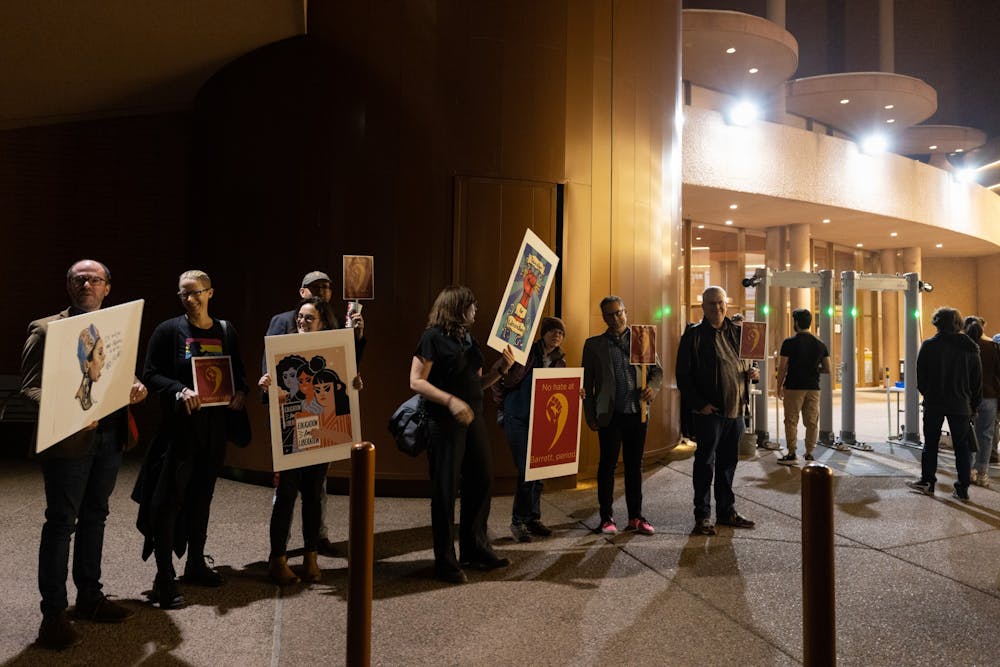An Arizona Senate bill that aims to expand First Amendment protections on publicly-funded college campuses narrowly passed the Senate along party lines. But as the bill continues to move through the House, it faces criticism from Democratic lawmakers, who say it is unnecessary.
Senate Bill 1013, sponsored by Sen. John Kavanagh, R-Fountain Hills, would amend language in two existing revised state statutes related to free expression on public universities and community colleges.
The bill text would change the first statute to specify that a person who is lawfully present on a university or community college "may engage in expressive activity," including a protest or demonstration in any "area where the person is lawfully present."
The bill would similarly change the second statute, stating that subject to reasonable time, place and manner restrictions, a public community college or universities may not limit any area on campus where free speech may be exercised by a person "who is lawfully present."
Kavanagh said that by including "lawfully present" in the language of the revised statues, free expression would be "perfectly legal anywhere on the campus where the person can legally be, as long as they are not disrupting people walking by or making noise and disrupting other activities."
However, critics of the bill, including Sen. Christine Marsh, D-Phoenix, question the meaning of "lawfully present," and say that it lacks a concrete definition.
"Is a student 'lawfully present' when in the middle of class? It just was too vague and had no specific goal," Marsh said.
READ MORE: Barrett event with Charlie Kirk, Dennis Prager draws faculty and student protest
Kavanagh said that "we've had previous bills that guarantee the right to demonstrate and protest, but there's more to the First Amendment than demonstrating and protesting."
The bill includes protections for expressive action, which includes things like handing out flyers, acquiring signatures for a petition and tabling for an organization, according to Kavanagh.
STATE PRESS PLAY: Jared Taylor visit highlights on-campus frustrations, questions about free speech at ASU
Kavanagh also said that he thinks some educational institutions interpreted the current law to mean that as long as they allowed protestors or demonstrators to express themselves somewhere on campus – in "free speech zones" – they were not restricting First Amendment activity.
Democratic lawmakers and other critics of the bill have said that the bill is largely unnecessary, due to the Arizona Board of Regents' implementation of the Chicago Statement of free expression – a set of values created by the University of Chicago to promote free speech.
"Speech freedom, of course, should be valued and protected," said Joseph Russomanno, a First Amendment expert and professor at the Cronkite School. "My concern with this bill, however, is that it is unnecessary because Arizona's universities have demonstrated their commitment to enforcing the protections already in place."
First Amendment advocacy organization, the Foundation for Individual Rights and Expression, has given the University the highest rating possible for First Amendment protections.
"For all three of the universities in Arizona to fall into (FIRE's) 'good' category is quite an achievement. So again, it's evidence like this that makes me ask, why is this even necessary at all?" Russomanno said.
Additionally, Marsh said that there is a possibility that this legislation could potentially limit free expression protections.
"I think that one of the unintended consequences of this bill is that it could actually limit who is protected on campuses for free speech," Marsh said.
Russomanno raised similar concerns, saying that "there are so many exceptions and caveats that it almost renders it useless."
"This bill seems to be a blatant political act, sponsored by a politician with extremely partisan views, that subtly but significantly weaponizes First Amendment values – a sword that ultimately serves to deny rights to some," Russomanno said.
Edited by Shane Brennan, Reagan Priest and Anusha Natarajan.
Reach the reporter at greygartin@gmail.com and follow @greygartin on Twitter.
Like The State Press on Facebook and follow @statepress on Twitter.




